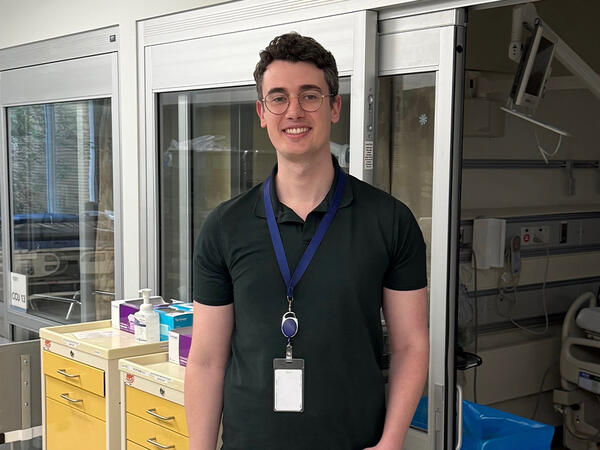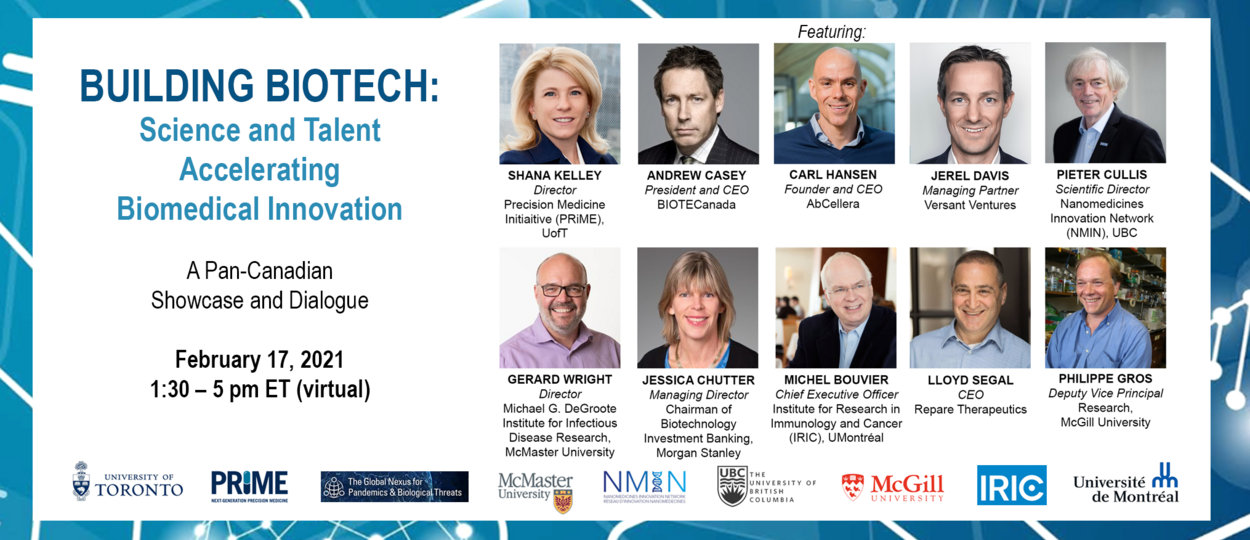U of T hosts discussion on growing biotech talent in Canada and how biomedical innovation can drive economic recovery
University of Toronto President Meric Gertler recently issued a challenge to “be bold and think big” in order to enhance Canada’s talent advantage in the post-pandemic, post-Trump and post-Brexit era.
PRiME — a University of Toronto-led global initiative focused on next-generation precision medicine — is responding to this challenge by working with university leadership and partners across Canada to call for government investment to establish Canadian biotechnology research hubs to transform health care and propel the bio-economy.
“Growing our talent base and creating a constellation of new companies launched from universities will be essential to realize the economic development and societal impact that the growth of the biotechnology industry can deliver,” said Shana Kelley, University Professor in the Leslie Dan Faculty of Pharmacy and Director of PRiME.
To highlight the high-growth potential for biomedical innovation and biotech in Canada, PRiME is hosting a virtual showcase, Building Biotech: Science and Talent Accelerating Biomedical Innovation, on February 17. It will feature a stellar panel of biotechnology leaders, scientists, entrepreneurs and investors representing Canada’s three main biotechnology ecosystems in Vancouver, Montreal and Toronto. Panelists will explore how investment in academic science can translate made-in-Canada discoveries to societal impact and health security while commercializing research can drive post-pandemic economic growth.
“Canadian biotech is a small industry with most of our graduates drawn to opportunities in the world-class U.S. biotech sector,” said Molly Shoichet, University Professor in the Faculty of Applied Science and Engineering who is a member of the PRiME steering committee and a serial entrepreneur.
“It doesn’t have to be this way. We have homegrown talent with strengths in basic science fundamentals, drug discovery and therapeutic development. What’s missing is meaningful government investment along the continuum of research to commercialization to transform Canadian biotech from a fledgling industry to a true powerhouse of Canadian economy,” said Shoichet.
Kelley, Shoichet and their colleagues across U of T believe that this discussion is critical in the context of the pandemic. The global rush to deploy a COVID-19 vaccine — with Canada effectively being out of the game due to the lack of biomanufacturing capacity — highlights how a thriving biotechnology industry could improve the country’s pandemic response, while also providing jobs for graduates and significant economic benefits.
It is also clear that the Canadian biomedical community is gaining momentum given recent successes including Repare Therapeutics, a therapeutics company that was started based on discoveries made by Dan Durocher, a researcher at U of T’s Lunenfeld-Tanenbaum Research Institute. Repare debuted on the NASDAQ with an Initial Public Offering (IPO) of more than $250 million USD. Fusion Therapeutics and AbCellera are two other spinouts from Canadian universities that also had large IPOs over the last six months.
Kelley will kick-off the event showcase with her talk, “Tackling Disease with Precision Therapeutics and Diagnostics: PRiME and the GTA Ecosystem.” She will be followed by four speakers representing Vancouver and Montreal biomedical innovation centres, all of whom lead highly translational and commercialization-focused organizations.
Following these sessions, Andrew Casey, CEO of BIOTECanada, will moderate a panel of entrepreneurs and investors discussing how to build momentum in the biotech sector. He believes that the social and economic impact of the pandemic has increased awareness of the important role the biotech sector can play in delivering innovative solutions.
“It will be biotech-based solutions — including vaccines and therapeutic drugs — that will facilitate the ability of society and the economy to return to normal. The biotech sector can also play a foundational role in the significant economic rebuild that lies ahead,” said Casey. “To maintain a globally competitive biotech sector it is critical that Canada invest now in manufacturing capacity, research institutes, scientific and entrepreneurial talent and companies.”
Casey, Kelley, and Shoichet agree that establishing a network of biotechnology hubs in Canada is a long-time coming and crucial for post-pandemic economic recovery.
“It’s time to transform Canada from a resource-based economy to a knowledge-based economy. With government investment, we can work quickly to build infrastructure, gather talent and create a breakthrough-to-commercialization pipeline of made-in-Canada discoveries that will address the needs of today and the unmet needs of tomorrow,” said Kelley.
Professor Christine Allen, U of T’s Associate Vice-President and Vice-Provost, Strategic Initiatives, agrees that investing in the future is important.
“The biomedical sciences at U of T and across Canada are an area of significant strength and a critical national resource that must be cultivated. We must invest in our future and support growth of our ecosystem in this area,” said Allen, who is also a Professor at the Leslie Dan Faculty of Pharmacy.
Register for Building Biotech: Science and Talent Accelerating Biomedical Innovation
By: Nicole Bodnar
More News
Image

Welcoming Ivy Lam as Academic Lead in Climate, Health & Sustainable Care
Assistant Professor Lam will guide the Leslie Dan Faculty of Pharmacy's efforts to embed environmental sustainability across the Faculty.
Read More
Image

Pharmacy alum’s research shows how full-scope practice improves cancer care
Honoured with a national award, Adrian de Boer says his residency experience was a powerful reminder that he's making a meaningful change to the pharmacy profession.
Read More
Image

Pharmacy alum passionate about helping community pharmacists practice to full scope
As a pharmacy leader at Rexall, Heidi Wittke uses frontline experience to lead initiatives that improve patient care
Read More
